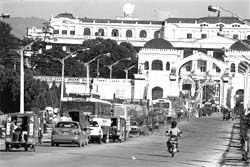After the dust settles

suddenly the air in Kathmandu is cleaner and does not burn your eyes or cause a feeling of suffocation. The sole reason for this drastic improvement in air quality is the banning of diesel-operated Vikram tempos from the capital's streets since September 1999. In their place battery-operated tempos have been introduced.
Although no proper research has been conducted, people involved with air quality monitoring in certain parts of Kathmandu say that the city has a huge problem with dust and other particulate matter in its air. With the polluting Vikrams gone, the level of air pollution is bound to drop. The present particulate pollution level of 207 microgrammes per cubic metre is way above the permissible standards. Others say the air quality of the city will improve by 35 per cent and traffic flow will be much better.
"Doctors at the Kanti Children's Hospital have conducted research on allergic children and found that 78 per cent of the children suffering from certian kind of allergies get better when they go out of Kathmandu valley," says Bhakta Bahadur Balayar, state minister of Population and Environment, who is spearheading the anti-pollution drive. "Not only that there is also indication that children were also developing other mental and physical abnormalities because of these vehicles, but now the allergy is no more there."
Balayar vows to continue his battle against pollution. "For me the battle is not over, it has just begun," he says. According to Balayar, there are still 700 petrol-operated Vikram tempos and 2,400 petrol-operated Bajaj tempos which have to be removed from Kathmandu. The government has already banned the import of two-stroke motorcycles into the Kathmandu valley but has not decided what to do with the 25,000 two-stroke motorcycles already imported.
"The government has adopted a new Nepal Vehicle mass Emission Standard 2056 which is equivalent to Euro-1 standards," said Balayar talking to Down To Earth. The government has banned the import of reconditioned vehicles and all vehicles already imported will have to conform to Euro- i standards. It has also set strict emission standards for official vehicles. All have to obtain emission clearance certificates by February 21 failing which they are liable to be auctioned.
But the introduction of battery-operated tempos has created a new problem - the dumping or recycling of batteries. It is expected that a minimum of 15 tonnes of battery will be recycled per day for which the country is not prepared. The ministry is currently discussing the issue with various donor agencies to set up recycling plants in Nepal.
The minister says that a number of projects to improve the environment in Kathmandu valley have been passed by the country's cabinet. These include a motor road along the banks of Bishnumati river, an alternate ring road for environmental friendly vehicles and import of Euro- i compliant vehicles. The government also plans to adopt a quota system like Singapore for purchase of cars.
Related Content
- Report on EC violations by CCL in Piparwar open cast project, Jharkhand, 14/09/2020
- Complex implications of the Cancun Climate Conference
- Moving the REDD debate from theory to practice: Lessons learned from the Ulu Masen Project
- Dust can kill (editorial)
- GPCB visits Vasco fishing jetty,collects coal dust samples
- Malwa's cancer belt' desperate for government attention
